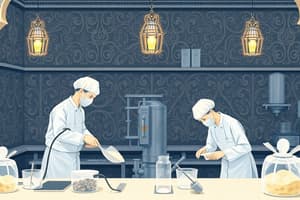Podcast
Questions and Answers
Food processing techniques focus on enhancing the nutritional value of food products.
Food processing techniques focus on enhancing the nutritional value of food products.
False (B)
Maintaining high hygiene standards in food processing facilities helps prevent contamination by bacteria and viruses.
Maintaining high hygiene standards in food processing facilities helps prevent contamination by bacteria and viruses.
True (A)
Regular deep cleaning of equipment is not necessary in food processing plants.
Regular deep cleaning of equipment is not necessary in food processing plants.
False (B)
Chemical contaminants like heavy metals do not pose health risks in food.
Chemical contaminants like heavy metals do not pose health risks in food.
Food processors use gas chromatography to analyze food samples for potential chemical hazards.
Food processors use gas chromatography to analyze food samples for potential chemical hazards.
Personal hygiene practices of workers in food processing plants do not impact food safety.
Personal hygiene practices of workers in food processing plants do not impact food safety.
Food processors are required to follow regulatory guidelines on acceptable levels of chemicals in food products.
Food processors are required to follow regulatory guidelines on acceptable levels of chemicals in food products.
Pasteurization and irradiation are techniques used to extend the shelf life of processed foods by killing or inhibiting microorganisms that cause spoilage.
Pasteurization and irradiation are techniques used to extend the shelf life of processed foods by killing or inhibiting microorganisms that cause spoilage.
Food processing companies are not required to implement any regulations or certifications to ensure food safety.
Food processing companies are not required to implement any regulations or certifications to ensure food safety.
Proper handling, temperature maintenance, and hygiene practices during transportation are crucial for maintaining product quality and preventing contamination.
Proper handling, temperature maintenance, and hygiene practices during transportation are crucial for maintaining product quality and preventing contamination.
Food processing companies are not responsible for ensuring the safety and quality of preserved foods.
Food processing companies are not responsible for ensuring the safety and quality of preserved foods.
The use of appropriate packaging materials can help preserve food safety and shelf life by minimizing exposure to air, light, and moisture.
The use of appropriate packaging materials can help preserve food safety and shelf life by minimizing exposure to air, light, and moisture.
Flashcards are hidden until you start studying
Study Notes
Reasons for Processing Foods: Focusing on Food Safety
Processing foods involves various techniques applied to food before it reaches the consumer's plate. These processes aim to enhance the appearance, flavor, texture, and shelf life of the food while ensuring its safety from potentially harmful microorganisms and chemicals. Food safety is a critical aspect of food processing, and it plays a crucial role in preventing foodborne illnesses. Here are some reasons why food processing focuses on food safety:
Enhancing Hygiene Standards
Food processors aim to maintain high standards of hygiene in food production facilities. They implement strict protocols to minimize the risk of contamination by bacteria, viruses, and parasites. Regular deep cleaning of equipment, sanitizing surfaces, and proper disposal of waste are essential practices in food processing plants. Additionally, workers are trained on proper personal hygiene and use of protective clothing to prevent microbial transfer to the food.
Monitoring Chemical Contaminants
Chemical contaminants in food, such as pesticides, heavy metals, and industrial pollutants, can pose significant health risks. Food processors implement strict quality control measures to detect and eliminate these contaminants from their products. Advanced technologies like mass spectrometry and gas chromatography are used to analyze food samples for potential chemical hazards. Processors also adhere to regulatory guidelines on acceptable levels of chemicals in food.
Preserving the Shelf Life of Foods
Preservation techniques like sterilization, pasteurization, irradiation, and refrigeration help maintain the freshness and extend the shelf life of processed foods. These processes kill or inhibit microorganisms that cause spoilage or illness. By ensuring the safety and quality of preserved foods, processors protect consumers from potential foodborne diseases and offer a reliable source of nutrition.
Enabling Safe Transport and Storage
Food processing involves transportation and storage systems to move products from origin to destination efficiently. Proper handling, temperature maintenance, and hygiene practices during transport are crucial to maintaining product quality and preventing contamination. Similarly, foods must be stored at appropriate temperatures to prevent bacterial growth and preserve nutritional value. The use of packaging materials that minimize exposure to air, light, and moisture helps preserve food safety and shelf life.
Implementing Strict Regulations and Certifications
Governments worldwide have implemented regulations to ensure food safety across different stages of production, distribution, and consumption. Compliance with these standards is often mandatory before selling or exporting food products. Additionally, certifications such as Hazard Analysis and Critical Control Points (HACCP) and Good Manufacturing Practice (GMP) assure customers that the food they consume has been produced under safe conditions.
In conclusion, food processing focuses on food safety due to various reasons, including enhancing hygiene standards, monitoring chemical contaminants, preserving shelf life, enabling safe transport and storage, and implementing strict regulations and certifications. These efforts aim to protect public health by providing safer food options while ensuring traceability and accountability throughout the supply chain.
Studying That Suits You
Use AI to generate personalized quizzes and flashcards to suit your learning preferences.




